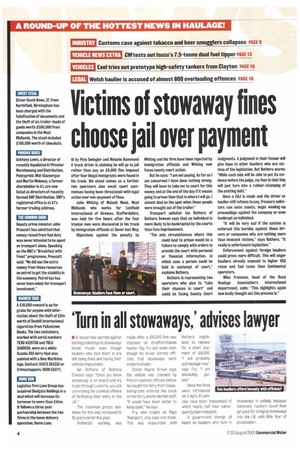Victims of stowaway fines choose jail over payment
Page 6

If you've noticed an error in this article please click here to report it so we can fix it.
ai by Pete Swingler and Melanie Hammond A truck driver is claiming he will go to jail rather than pay an £8,000 fine imposed after four illegal immigrants were found in his truck. His stand Games as a further two operators also await court summonses having been threatened with legal action over non-payment of fines.
John Whiting of Walsall Wood, West Midlands who works for Lichfield International of Alrewas, Staffordshire, was held for five hours after the four Iranian men were discovered in his truck by immigration officials at Dever last May.
Objections against the penalty by Whiting and his firm have been rejected by immigration officials and Whiting now faces county court action.
But he says: "I am not paying. As far as I am concerned I have done nothing wrong. They will have to take me to court for this money and at the end of the day if it means going to prison then that is where I will go. I almost died on the spot when these people were brought out of the trailer."
Transport solicitor Ian Rothera of Rothera Dawson says that an individual is more likely to be bankrupted by the courts than face imprisonment.
"The only circumstances where this could lead to prison would be a failure to comply with orders to provide the court with personal or financial information, in which case a person could be held in contempt of court," explains Bothers.
Rothera is representing two operators who plan to "take their chances in court" and could be facing County Court Judgments. A judgment in their favour will give hope to other hauliers who are victims of the legislation. But Rothera warns: "While each side will be able to put its evidence before the judge, my fear is that this will just turn into a rubber-stamping of the existing debt."
Once a CC,J is made and the driver or haulier still refuses to pay, Treasury solicitors can seize assets, begin winding-up proceedings against the company or even bankrupt an individual.
"It will be very sad if the system is enforced this harshly against those drivers or companies who are nothing more than innocent victims," says Rothera. "It really is unfortunate legislation."
Enforcement against foreign hauliers could prove more difficult. This will anger hauliers already exposed to higher VED rates and fuel taxes than Continental operators.
Mike Freeman, head of the Road Haulage Association's international department, adds: "This highlights again how badly thought out this process is."




































































































